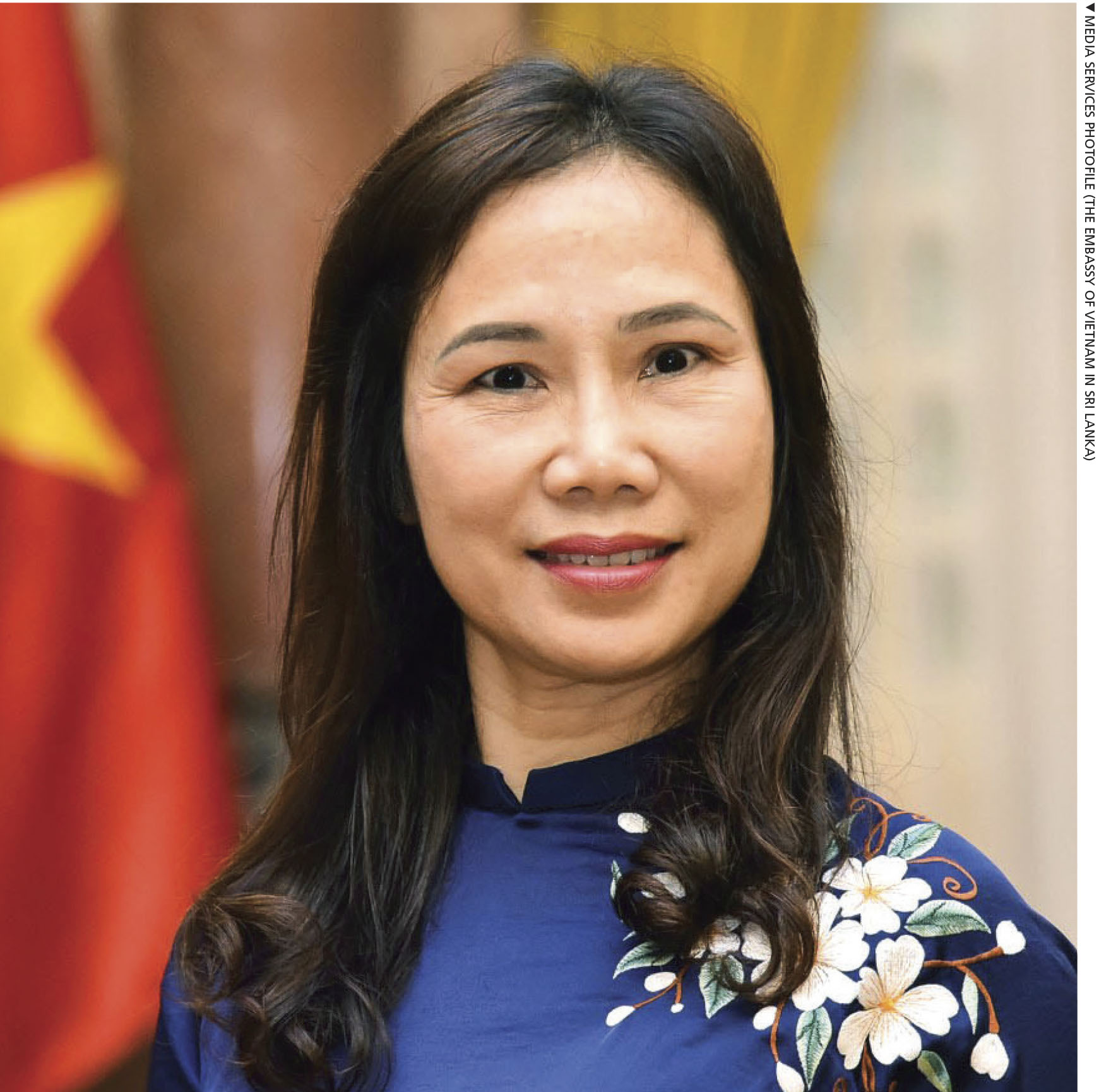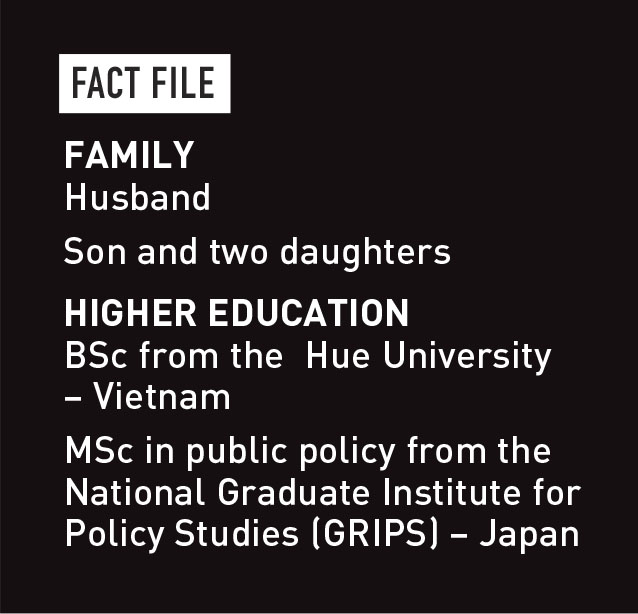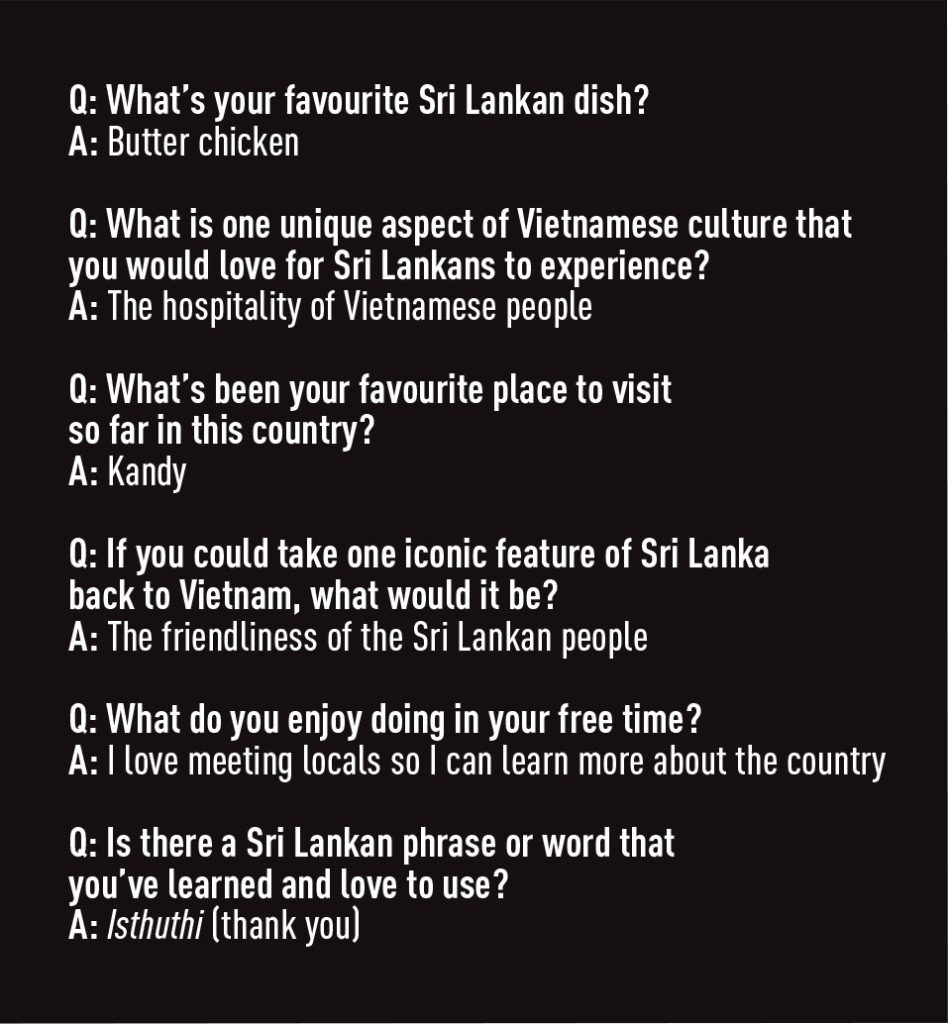FIFTY-FIVE AND FLOURISHING
Vietnam and Sri Lanka place significant importance on economic cooperation, which has seen steady growth despite challenges
Vietnam’s ambassador to Sri Lanka
Trinh Thi Tam

Q: As Sri Lanka and Vietnam prepare to celebrate the 55th anniversary of diplomatic ties, how do you view the evolution of this relationship?
A: We have had a longstanding interaction before diplomatic relations were officially established in 1970. Over the past 55 years, on the basis of mutual respect and understanding, these relations have developed consistently and yielded many important achievements in all channels and sectors.
Political trust has been consolidated; cooperation in key areas such as trade, investment, agriculture, fisheries, education, culture and people-to-people exchange has expanded; and close coordination at multilateral forums has been maintained.
Bilateral relations between our two countries are bringing benefits to their people, and contributing to peace, stability and development in the region and across the world.
Q: Trade between Vietnam and Sri Lanka has seen steady growth. What are the main areas of economic cooperation – and how can this partnership be expanded?
A: Both nations place significant importance on economic cooperation, which has seen steady growth despite challenges including the COVID-19 pandemic. In recent years, trade turnover between the two countries has reached approximately US$ 300 million annually.
Sri Lanka currently operates 30 projects in Vietnam with the total investment capital exceeding 42 million dollars. However, there remains substantial potential for further expansion of economic ties.
Opportunities include promoting trade in both goods and services, exploring possible joint ventures in high-tech agriculture, renewable energy, technology and infrastructure development, along with strengthening SMEs through technology transfer and capacity building initiatives.
Additionally, tourism represents a promising industry that can enhance the economic partnership between the two countries – with religious tourism offering a unique area of strength.
Q: Vietnam has emerged as a dynamic economy in Southeast Asia. How can Sri Lanka benefit from its development model – particularly in sectors such as agriculture, manufacturing and tourism?
A: Our agricultural success stems from policy reforms, technology adoption and a strong export orientation.
For example, Vietnam provides incentives to encourage farmers to engage in large-scale farming, ensures easy access to credit for small-scale farmers, invests in science and technology to develop more productive and climate resilient rice varieties, and enhances post-harvest technology to increase yields and minimise waste.
These measures contribute significantly to ensuring food security and boosting exports.
As for manufacturing, Vietnam has established industrial and technological parks, and economic zones, offering incentives to attract foreign investment. This is further supported by 17 free trade agreements (FTAs) currently in force.
Additionally, it invests in technical and vocational training to equip its workforce with the skills needed to meet industry demands.
In tourism, Vietnam goes beyond promoting and marketing well-known destinations by offering visitors a diverse range of experiences including ecotourism, community based tourism, gastronomic tourism, health tourism and more. And Vietnam is eager to share its experiences and insights with Sri Lanka to support economic development efforts.

Q: In the face of global challenges, how can Vietnam and Sri Lanka collaborate to address these issues effectively?
A: As two dynamic and developing countries in Asia, Vietnam and Sri Lanka can cooperate bilaterally or with other nations to address global challenges. Vietnam can share its experience in climate resilient agriculture while Sri Lanka can contribute its expertise in sustainable fisheries, forest preservation and wildlife protection.
Both countries can also collaborate on renewable energy projects such as solar and wind energy, leveraging Vietnam’s growing renewable energy sector and Sri Lanka’s commitment to sustainability.
Additionally, the two countries can work together to address traditional security threats including terrorism, transnational crimes and human trafficking.
Q: Looking ahead, what are the key priorities for Vietnam in terms of enhancing its diplomatic and economic presence here in Sri Lanka?
A: We have set ambitious goals to increase bilateral trade and investment, and strengthen cooperation in traditional sectors such as agriculture, fisheries, education, culture, tourism and Buddhism, while expanding into new potential areas including construction, technology, pharmaceuticals and renewable energy.
The two countries will also collaborate to address common regional and global issues, such as climate change and energy transition. This multifaceted approach not only strengthens bilateral relations but also contributes to regional peace and development.


